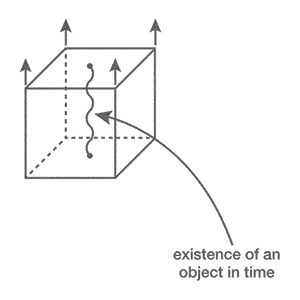The B-theory of time, also called the ‘tenseless theory of time,’ is one of two positions regarding the temporal ordering of events in the philosophy of time. B-theorists argue that the flow of time is only a subjective illusion of human consciousness, that the past, present, and future are equally real, and that time is tenseless: temporal becoming is not an objective feature of reality. Therefore, there is nothing privileged about the present, ontologically speaking.
The B-theory is derived from a distinction drawn by English idealist metaphysician J. M. E. McTaggart between A series and B series. The B-theory is often drawn upon in theoretical physics, and is seen in theories such as eternalism (the view that all existence in time is equally real, as opposed to presentism or the growing block universe theory of time, in which at least the future is not the same as any other time).
read more »
B-theory of Time
Killing Baby Hitler
Killing baby Hitler is a thought experiment in ethics and theoretical physics which poses the question of using time travel to assassinate an infant Adolf Hitler. It presents an ethical dilemma in both the action and its consequences, as well as a temporal paradox in the logical consistency of time. Killing baby Hitler first became a literary trope of science fiction during World War II and has since been used to explore these ethical and metaphysical debates.
Public debate around the question of killing baby Hitler reached its height in late 2015, after ‘The New York Times’ published a poll asking its readers the question. 42% said they would kill baby Hitler, 30% said they would not and 28% were undecided. Advocates of killing baby Hitler included Florida governor Jeb Bush and film actor Tom Hanks, while comedian Stephen Colbert and pundit Ben Shapiro were counted among the opponents of the policy.
read more »
Mango Cult
The mango cult was the worship of mangoes in China after Mao gave a box of mangoes, given to him by the Pakistani Foreign Minister, to workers at Tsinghua University in 1968. Instead of being eaten, the mangoes were preserved in formaldehyde, or sealed in wax for veneration.
One dentist from Fulin, Dr. Han Guangdi, saw the mango and said it was nothing special and looked just like sweet potato. He was put on trial for malicious slander, found guilty, paraded publicly throughout the town, and then executed with one shot to the head. Mangoes are now common in China, and are seen as a common consumer good.
read more »
Roko’s Basilisk
Roko’s basilisk [bas-uh-lisk] is a thought experiment which states that an otherwise benevolent artificial superintelligence (AI) in the future would be incentivized to create a virtual reality simulation to torture anyone who knew of its potential existence but did not directly contribute to its advancement or development, in order to incentivize said advancement.
It originated in a 2010 post at discussion board LessWrong, a technical forum focused on analytical rational enquiry. The thought experiment’s name derives from the poster of the article (Roko) and the basilisk, a mythical creature capable of destroying enemies with its stare.
read more »
Jewish-American Patronage of Chinese Restaurants
The Jewish-American patronage of Chinese restaurants became prominent in the 20th century, especially among Jewish New Yorkers. It has received attention as a paradoxical form of assimilation by embracing an unfamiliar cuisine that eased the consumption of non-kosher foods.
Factors include the relative absence of dairy products compared to European cuisines, concern over German and Italian antisemitic regimes in the 1930s and the proximity of Jewish and Chinese immigrants to each other in New York City.
read more »
Mumpsimus
A mumpsimus [muhmp-suh-muhs] is a ‘traditional custom obstinately adhered to however unreasonable it may be,’ or ‘someone who obstinately clings to an error, bad habit or prejudice, even after the foible has been exposed and the person humiliated; also, any error, bad habit, or prejudice clung to in this fashion.’
The term originates in the story of a priest using the nonsense Latin word ‘mumpsimus’ instead of ‘sumpsimus’ (lit. ‘we have taken’) when giving mass, and refusing to be corrected on the matter. The word may refer to either the speaker or their habit.
read more »
Fiddler’s Green
In 19th-century English maritime folklore, Fiddler’s Green was an afterlife for sailors who had served at least fifty years at sea.
They were rewarded with perpetual mirth, a fiddle that never stopped playing, and dancers who never tired.
read more »
Kids These Days
‘Kids these days‘ is the belief that the present generation of young people is inferior or deficient compared to previous generations.
Such beliefs have been reported since 624 BCE. Ancient philosopher Socrates complained, ‘The children now love luxury; they have bad manners, contempt for authority; they show disrespect for elders and love chatter in place of exercise.’
Omphalos Hypothesis
The Omphalos [om-fuh-luhs] hypothesis is one attempt to reconcile the scientific evidence that the universe is billions of years old with a literal interpretation of the Genesis creation narrative, which implies that the Earth is only a few thousand years old.
It is based on the religious belief that the universe was created by a divine being, within the past six to ten thousand years (in keeping with flood geology), and that the presence of objective, verifiable evidence that the universe is older than approximately ten millennia is due to the creator introducing false evidence that makes the universe appear significantly older.
read more »
Salamander Letter
The salamander letter was a controversial document about the history of the Latter-day Saint (LDS) movement that presented a view of LDS founder Joseph Smith’s life that stood sharply at odds with the commonly accepted version of the early progression of the church Smith established.
The letter was one of hundreds of documents concerning the history of the LDS movement that surfaced in the early 1980s. Initially accepted by some document experts and collectors, the document was later demonstrated to be a forgery created by Mark Hofmann, who had been responsible for the ‘discovery’ of many other notable documents.
read more »
Jack Mormon
Jack Mormon is a slang term originating in nineteenth-century America originally used to describe a person who was not a baptized member of the Church of Jesus Christ of Latter Day Saints but who was friendly to church members and Mormonism, sympathized with them, and/or took an active interest in their belief system.
Sometime in the early- to mid-twentieth century, however, the term began to refer to an individual deemed by adherents of The Church of Jesus Christ of Latter-day Saints (LDS Church) to be an inactive or lapsed member of the LDS Church who, despite his personal religious viewpoint, maintained good relations with and positive feelings toward the church.
read more »
Wassily Kandinsky
Wassily Kandinsky [kan-din-skee] (1866 – 1944) was a Russian painter, printmaker and art theorist. He was a major figure in modern art and painted some of the first modern abstract works. His art changed several times during his life. It was fauvist, abstract, expressionist and constructivist in turn.
He was interested in geometry in art and philosophy. The creative aspect of the form is expressed by a descending series of circles, triangles and squares. Kandinsky’s creation of abstract work followed a long period of development and maturation of intense thought based on his artistic experiences. He called this devotion to inner beauty, fervor of spirit, and spiritual desire inner necessity.
read more »













